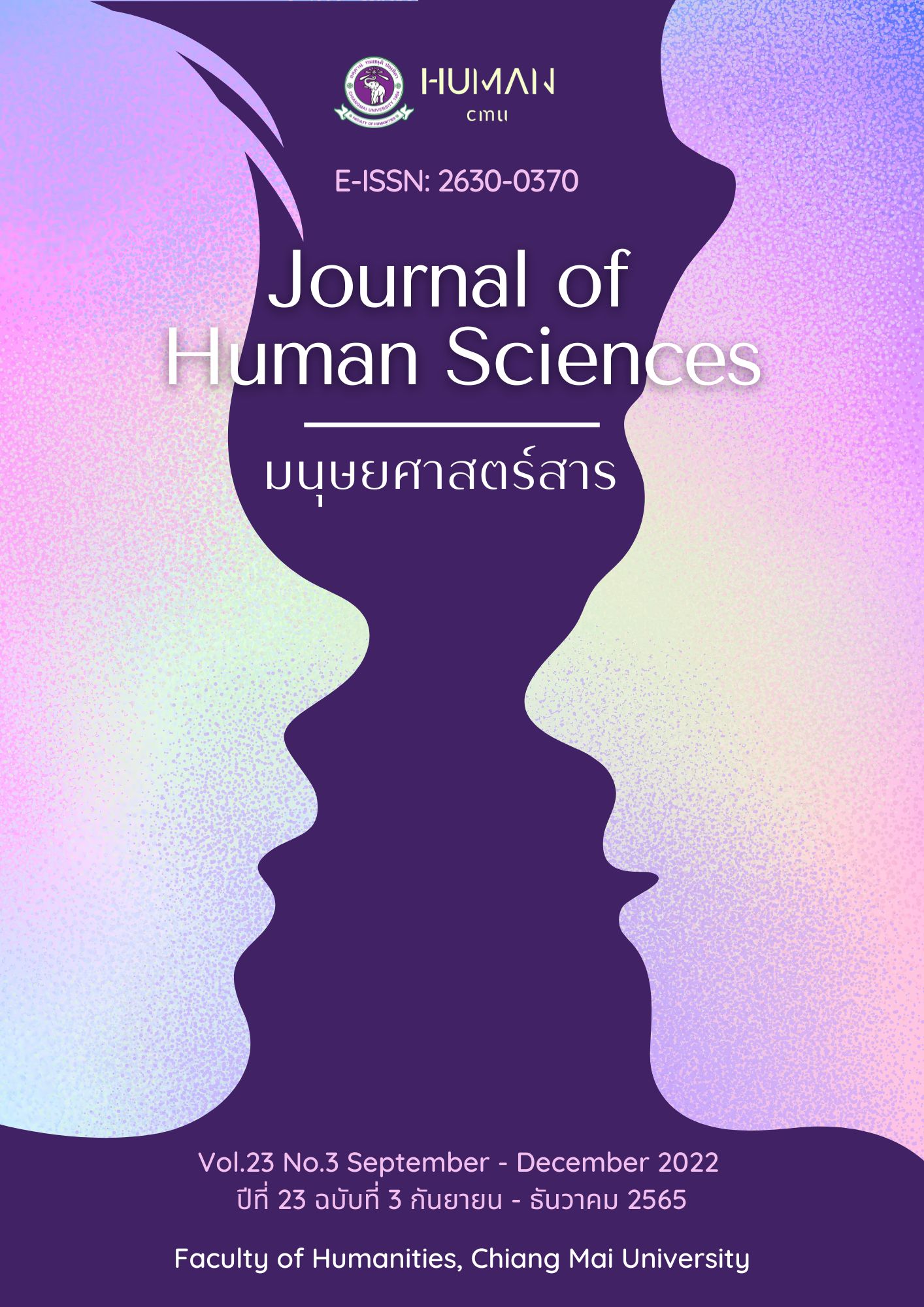ขั้วตรงข้ามเชิงมโนภาพและการควบคุมทางเพศของสตรีใน แบบเรียนภาษาไทยภาษาพาทีและวรรณคดีลำนำ
Main Article Content
บทคัดย่อ
การรณรงค์ #Saveเกี๊ยวแสดงให้เห็นถึงความกังวลของประชาชนที่มีต่อการนำเสนอภาพลักษณ์หญิงร้ายและบทเรียนเรื่องเพศในชุดแบบเรียนภาษาไทยภาษาพาที การศึกษานี้ต้องการทำความเข้าใจปรากฏการณ์นี้ด้วยการศึกษากลยุทธ์ทางภาษาที่ใช้ในการนำเสนอภาพลักษณ์ที่เป็นปัญหานี้ ขั้นตอนแรกคือการใช้ syntactic triggers เช่น "X instead of Y," "although X, Y,”นำเสนอโดย Jeffries (2014) และ Davies (2013) เพื่อศึกษาขั้วตรงข้ามทางภาษาที่เกิดขึ้นร่วมกัน และบทบาทของขั้วตรงข้ามเหล่านี้ในการสร้างจิตสำนึกร่วมของชุมชน
ข้อมูลที่ใช้นำมาจากชุดแบบเรียนภาษาไทยภาษาพาที และวรรณคดีลำนำสำหรับชั้นประถมศึกษาปีที่หก ผลการศึกษาพบขั้วตรงข้ามเชิงมโนภาพเช่น CHILD/ADULT WELL-BEHAVED/MISBEHAVED และ INDIVIDUAL/COLLECTIVE ซึ่งถูกใช้ในการสร้างความรู้สึกเป็นอันหนึ่งอันเดียวกันของชุมชน ผ่านการเน้นย้ำความสำคัญของลำดับชั้นทางสังคม และการสร้างแบบอย่างความเป็นปรกติ นอกจากนี้ขั้วตรงข้ามเชิงมโนภาพที่เชื่อมโยงกับชุมชนในอุดมคตินี้ยังมีส่วนร่วมในการควบคุมพฤติกรรมทางเพศของสตรีเช่นเดียวกัน
การใช้ขั้วตรงข้ามเชิงมโนภาพซ้ำไปซ้ำมาเป็นเครื่องมือที่มีประโยชน์ในการย้ำเตือนและทำบทเรียนที่ซับซ้อนให้เข้าใจง่ายขึ้น อย่างไรก็ดีการใช้ขั้วตรงข้ามอาจเป็นการนำเสนอสถานการณ์ที่ง่ายเกินไป โดยเฉพาะเมื่อนำขั้วตรงข้ามเชิงมโนภาพที่แสดงถึงความเป็นพวกเขาพวกเราอย่าง US/THEM มาใช้เพื่อจัดการเด็กที่มีปัญหา ยิ่งไปกว่านั้นการรณรงค์ #Saveเกี๊ยว ยังได้แสดงให้เห็นถึงมุมมองที่ขัดแย้งกันระหว่างภาคประชาชนและรัฐในเรื่องการสร้างคุณลักษณะที่ดีงามของผู้หญิง ซึ่งแสดงให้เห็นว่าแบบเรียนนี้อาจไม่เหมาะสมกับคนรุ่นนี้ เนื่องจากการขาดแคลนความหลากหลายและการเน้นย้ำอุดมการณ์ทางเพศหลักมากเกินไป
Article Details

อนุญาตภายใต้เงื่อนไข Creative Commons Attribution-NonCommercial-NoDerivatives 4.0 International License.
เอกสารอ้างอิง
Anderson, B. (2006). Imagined communities: Reflections on the origin and spread of
nationalism. Verso books.
Anthias, F., & Yuval-Davis, N. (1989). Woman-nation-state. Springer.
Cruse, A. (2011). Meaning in language: An introduction to semantics and pragmatics. Oxford
University Press.
Davies, M. (2013). Oppositions and ideology in news discourse. A&C Black.
Davies, M. (2019). Stark choices and brutal simplicity: the blunt instrument of constructed
oppositions in news editorials. In The Routledge Handbook of Language in Conflict (pp. 44-63). Routledge.
Dwyer, L. K. (2012). Spectacular sexuality: nationalism, development and the politics of family
planning in Indonesia. In Gender ironies of nationalism (pp. 25-62). Routledge.
Enloe, C. (2014). Bananas, beaches and bases: Making feminist sense of international politics.
Univ of California Press.
Eoseewong, N. (2004). Thai, Thailand, textbooks and monuments [ชาติไทย เมืองไทย แบบเรียน และ
อนุสาวรีย์]. Bangkok: Matichon.
Fairclough, N. (1992). Discourse and social change (Vol. 10). Cambridge: Polity Press.
Fairclough, N. (2003). Analysing discourse: Textual analysis for social research. Psychology
Press.
Harrison, R. V. (Ed.). (2014). Disturbing conventions: decentering Thai literary cultures. Rowman &
Littlefield.
Jaithiangtham, J. (2014). Gender and Sexuality Discourse analysis in Secondary School’s Thai
Textbooks [การวิเคราะห์วาทกรรมเรื่อง “เพศ” ในหนังสือเรียนวิชาภาษาไทย ชั้นมัธยมศึกษาตอนต้น].
Journal of Integrated Sciences. 11(1), 58-109.
Last Book in the Universe. (n.d.). #Saveเกี๊ยว time to change inappropriate textbook
Content [#Saveเกี๊ยว ถึงเวลาปรับเนื้อหาไม่เหมาะสมในแบบเรียนภาษาไทย]. Change.org. https://www.change.org/p/ถึงเวลาปรับเนื้อหาไม่เหมาะสมในแบบเรียนภาษาไทย-saveเกี๊ยว
Jeffrey, L. A. (2007). Sex and borders: Gender, national identity and prostitution policy in
Thailand. University of British Columbia Press.
Jeffries, L. (2014). Opposition in discourse: The construction of oppositional meaning.
Bloomsbury Publishing.
Jiamwijak, R. (2018). Analysis of PasaPatee Thai Textbooks: Consistency with Strategy 1 on
Capacity Building and Development of Human Capital in the 12th National Economic and Social Development Plan [การศึกษาหนังสือเรียนภาษาไทย ภาษาพาที: ความสอดคล้องกับยุทธศาสตร์ที่ 1 การเสริมสร้างและพัฒนาศักยภาพทุนมนุษย์ ในแผนพัฒนาเศรษฐกิจและสังคมแห่งชาติ ฉบับที่สิบสอง]. Thammasat University. Journal of Liberal Arts, Thammasat University, 18(2), 26-54.
Lekkla, N. (2021). Changes of discourse on gender and sexual diversity in sexuality education
textbooks from perversion to acceptance under the concept of multiculturalism that is
just a discourse [การเปลี่ยนแปลงวาทกรรมเกี่ยวกับความหลากหลายทางเพศในแบบเรียนเพศวิถีศึกษาจากความผิดปกติสู่การยอมรับภายใต้พหุวัฒนธรรมที่เป็นเพียงวาทกรรม]. Journal of Language and Culture, 40(2), 79-95.
Leksakun, S. (2019). The Form of “Good Man” in Elementary Thai Language Textbooks [แบบของ
“คนดี” ในหนังสือเรียนภาษาไทยระดัับชั้นประถมศึกษา]. Panidhāna Journal, 15(2), 363-390.
Mayer, T. (Ed.). (2012). Gender ironies of nationalism: Sexing the nation. Routledge.
McDowell, L. (2004). Gender, identity and place: Understanding feminist geographies. John
Wiley & Sons.
Mosse, G. L. (2020). Nationalism and sexuality: Middle-class morality and sexual norms in
modern Europe. University of Wisconsin Press.
Mulholland, J., Montagna, N., & Sanders-McDonagh, E. (Eds.). (2018). Gendering nationalism:
Intersections of nation, gender and sexuality. Springer.
Nammontree, N. (2018). Representations Appearing through Major Characters in the Basic Thai
Textbook Series PasaPatee for Students from Grades 1-6 of Primary Schools [ภาพแทนที่ปรากฏในตัวละครเอก จากหนังสือเรียนรายวิชาพื้นฐานภาษาไทย ชุดภาษาพาที ระดับชั้นประถมศึกษาปีที่ 1-6]. Rajabhat Maha Sarakham University Journal, 12(2), 467-480.
Office of the Basic Education Commission, Ministry of Education. (2019). Basic Thai language
textbook, language for life series: Language saying for Grade 6 [หนังสือเรียนรายวิชาพื้นฐานภาษาไทย ชุดภาษาพาที ระดับชั้นประถมศึกษาปีที่ 6] (11th ed.). Business Organization of the Office of the Welfare Promotion Commission for Teachers and Educational Personnel.
Office of the Basic Education Commission, Ministry of Education. (2018). Basic Thai language
textbook, language for life series: Literature Rhythm for Grade 6 [หนังสือเรียนรายวิชาพื้นฐานภาษาไทย ชุดวรรณคดีลำนำ ระดับชั้นประถมศึกษาปีที่ 6] (11th ed.). Business Organization of the Office of the Welfare Promotion Commission for Teachers and Educational Personnel.
Panpothong, N. (2015). Thai Primary School History Textbooks: A textually-oriented Critical
Discourse Analysis [แบบเรียนประวัติศาสตร์ ภาษากับอุดมการณ์ วาทกรรมวิเคราะห์เชิง
วิพากษ์]. Language and Linguistics, 34(1), 66-93.
Sanders-McDonagh, E. (2016). Women and sex tourism landscapes. Routledge.
Thida, P., Nilawanapa, R., & Weesapen, W. (2014). Creating Desirable Characteristics as Found in
Thai Textbooks for Elementary Students [การสร้างคุณลักษณะอันพึงประสงค์ที่ปรากฏในหนังสือเรียนภาษาไทยระดับประถมศึกษา]. Rajabhat Maha Sarakham University Journal, 8(1), 63-70.
Van Dijk, T. A. (1989). Structures of Discourse and Structures of Power, Annals of the
International Communication Association, (12)1, 18-59.
Van Dijk, T.A. (1993). Principles of critical discourse analysis. Discourse & society, 4(2),
-283.
Vijayan, P. K. (2019). Gender and Hindu Nationalism: Understanding Masculine Hegemony.
Routledge.
Wodak, R. (2009). Discursive construction of national identity. Edinburgh University Press.
Yodhong, C. (2020). #saveเกี๊ยว from textbooks and imagination of good and bad women in the
Society [#Saveเกี๊ยว จากแบบเรียนภาษาไทยและจินตนาการหญิงดี-หญิงเลวในสังคม]. https://thematter.co/thinkers/kyo-and-thai-norm-about-being-good-girl
Yuval-Davis, N. (1997). Gender and nation: SAGE publications.


